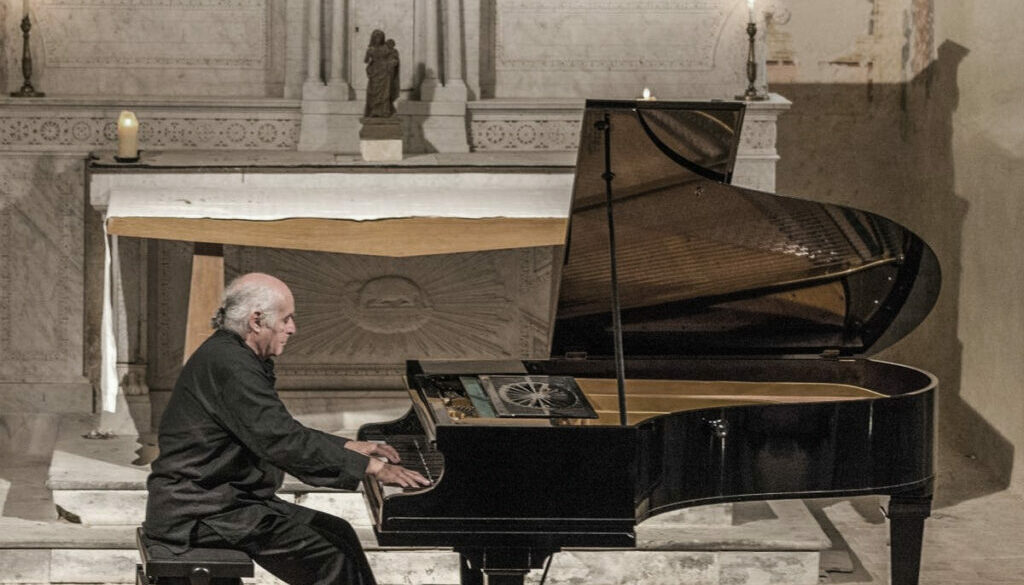Alain Kremski: A Life Devoted to Music and Spirit
Alain Kremski was a French composer, pianist, and percussionist whose work was deeply infl uenced by his spiritual quest and his fascination with the music of Gurdjieff . His journey into the spiritual dimensions of music was not just a personal exploration but also a profound artistic mission that he shared with the world through his recordings and performances. Alain Kremski, a name that resonates with elegance and innovation in the world of classical music, is a pianist and composer whose works have left an indelible mark on the musical landscape. Born with an innate connection to the piano, Kremski’s artistry is a blend of technical mastery and profound emotional depth. His compositions, often described as poetic and introspective, draw inspiration from a wide array of infl uences, ranging from classical traditions to spiritual and philosophical themes. Kremski’s approach to composing is deeply personal; he views the piano not just as an instrument, but as a medium for expressing the ineff able. His works, such as Les Cloches and Les Voix Intérieures, are celebrated for their ability to transport listeners to a realm of contemplation and beauty, where every note feels like a whispered secret.
Kremski’s interest in Gurdjieff ‘s music was rooted in its mystical and transformative qualities. Gurdjieff , a spiritual teacher and composer, believed that music could serve as a bridge to higher states of consciousness. Kremski was particularly drawn to this idea, and he dedicated a signifi cant part of his career to interpreting and performing Gurdjieff ‘s compositions. His recordings of Gurdjieff ‘s works are often described as deeply meditative, capturing the essence of the music’s spiritual intent.
In addition to his performances, Kremski also explored the spiritual dimensions of music through his own compositions. His works often incorporated elements of Eastern and Western musical traditions, refl ecting his belief in the universal language of music. He was known for his use of percussion instruments, which he believed could evoke primal and spiritual energies.
Kremski’s spiritual inner search was also evident in his approach to performance. He often spoke about the importance of being fully present and attuned to the moment when playing music. For him, each performance was a form of meditation, a way to connect with the deeper, more profound aspects of existence.
In writing another chapter about Alain Kremski’s spiritual inner search in music, one could delve deeper into his personal refl ections on the transformative power of music. His writings and interviews reveal a man who saw music not just as an art form but as a spiritual practice. He believed that through music, one could access higher states of awareness and achieve a sense of unity with the cosmos.
Kremski’s recordings and performances of Gurdjieff ‘s music could be analyzed in greater detail, highlighting the ways in which he brought out the spiritual essence of the compositions. His interpretations were often praised for their depth and sensitivity, and they continue to inspire listeners to this day.
Furthermore, one could explore Kremski’s collaborations with other artists who shared his spiritual vision. His work with musicians from diff erent cultural backgrounds refl ects his belief in the universality of music and its ability to transcend cultural and linguistic barriers.
Born on April 4, 1940, in Paris, Alain Kremski was destined for a life steeped in music. The son of pianist Serge Petitgirard and Lina Kremska, who worked at Deutsche Grammophon, Kremski’s talent fl ourished early. At seventeen, he won a grant judged by Nadia Boulanger, Igor Stravinsky, and Aaron Copland. A graduate of the Paris Conservatoire with six fi rst prizes, he later claimed the Premier Grand Prix de Rome (1962) and the Prince Pierre of Monaco Composition Prize (1969). In 1976, he crafted a unique instrument from 120 ancient Iranian bells, and his performances with Tibetan singing bowls captivated audiences, even drawing the 10th Panchen Lama to a recital in Beijing.
A passionate advocate for Tibetan freedom, Kremski collaborated with organizations like the Comité de soutien au peuple tibétain. His life and philosophy were immortalized in Anne Bramard-Blagny’s 2007 documentary, Alain Kremski, à la source du son.
Kremski’s legacy lives on through his recordings, compositions, and unforgettable performances; he spirit is constantly present at the Piano Revenge Festival, where his artistic vision continues to inspire. Kremski’s connection to the Piano Revenge Festival and the Théâtre de l’Île Saint-Louis is a testament to his enduring legacy in the world of live performance. The festival, known for its celebration of piano music in all its forms, has been graced by Kremski’s presence on multiple occasions. His performances at the Théâtre de l’Île Saint-Louis, a venue renowned for its intimate and acoustically rich setting, were nothing short of magical. Kremski’s ability to connect with the audience, combined with his unique interpretations of both his own works and classical repertoire, made him a cherished fi gure at the festival. Alain Kremski’s contributions to the world of piano music are a testament to his genius and his unwavering dedication to his craft. His works continue to inspire, and his legacy lives on through the Piano Revenge Festival, where his spirit of creativity and passion for the piano remains a guiding light. Though Kremski has now passed away, his profound artistry and spiritual vision remain a central inspiration for the festival and its soul, ensuring his legacy continues to resonate with audiences and musicians alike. This connection was further deepened through his invisible collaboration with Anna Bondareva, the visionary founder and artistic director of the Piano Revenge Festival. Bondareva, a driving force behind the festival’s success, has long championed artists who redefi ne the possibilities of piano music.



